Adsactly Literature - The return, a story by Guy Maupassant
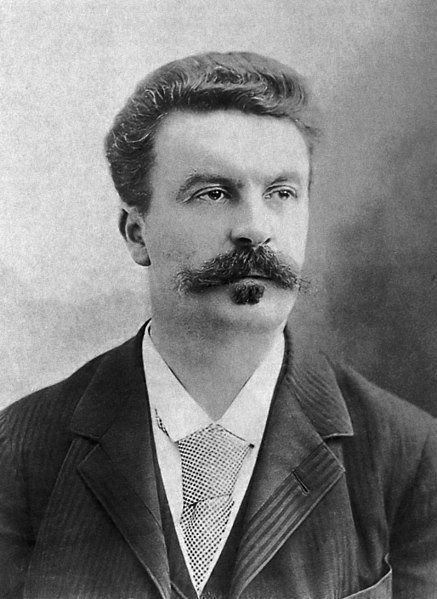
The return, a story by Guy Maupassant

Hello, dear readers. Reading can become an excellent hobby. Every time we read a good book, a good text, be it essay, narrative or poetic, we are opening a window into a world we didn't know before. Reading can give us life and knowledge. That is why today I would like to share with you the reading of one of the greatest universal writers: Guy Maupassant.
Guy Maupassant was a French writer, who became known not only for his novels, but also for his short stories, which led him to be recognized as one of the best storytellers in the world. Proof of this is Bola de sebo, a story that made him famous as an author and where the hypocritical nature of some societies is told with irony. We must say that most of his first short stories appeared in magazines, then, after achieving fame, his stories were republished and translated by major publishers. Of those many stories, almost three hundred, today I wanted to select one: The Return
The Return (Le retour ) is a 1884 tale about a man's return home after many years and after he was considered dead. The interesting thing about the story is that seeing herself alone with two daughters, the wife remarries another man with whom she has other children. The dilemma begins when the first husband appears and explains what has happened. In this simple story we see how a fortuitous event can move the foundation of an entire family. The story maintains an atmosphere of disbelief, but at the same time a natural and real air that makes it credible, like those stories that can be heard in any family or social gathering.
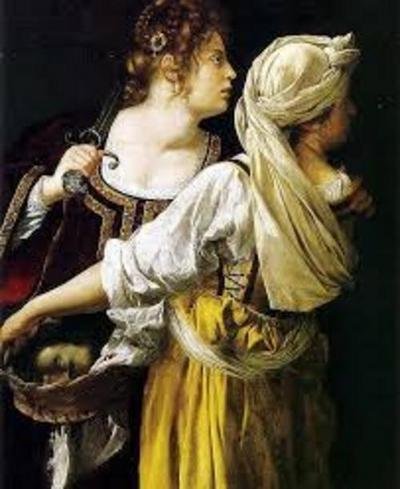
Everything begins with the description of the landscape, of the house in which the woman and her children find themselves. It is a humble, marine environment in which colours and smells abound. It is a house where there are vegetable gardens, there are also many children, who are entertained while the mother does housework. In this environment, half bucolic, there appears a stranger who looks at them. Apparently, from what they say, it's not the first time she's been there:
-Mom!
And the mother responds:
-What do you want?
-There it is again!
They've been restless since morning because a man wanders around the house: an old man who looks poor, very poor. They saw him for the first time when he accompanied his father to the sea and he was sitting in front of the door, in the gutter. Then, when they came back from the beach, they found him in the same place and always looking at the house.
He looked sick and miserable. He had remained motionless for more than an hour; then, perhaps realizing that he was instilling the misgivings of a malefactor, he got up and crawled away with one leg.
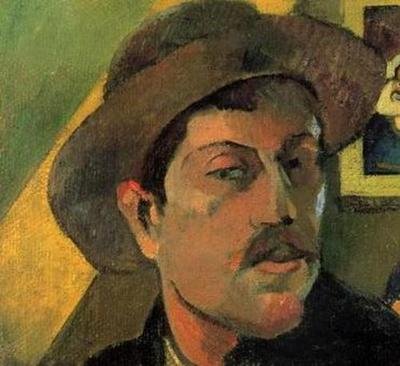
In this passage we can see the first reaction of women to the intruder and the physical description of the man. The man is aware of the feeling of suspicion that he awakens in women and leaves, but he returns again and always with the same attitude: looking towards home. If there is one thing that attracts attention in many of Maupassant's stories, it is the way he treats his female characters, and this story is no exception. Here we see how the only characters that have a name are men: the first husband is called Martín and the second, Levesque. The wife is called with the name of the first and second husband: La Martín Levesque; the same happens with the daughters of the wife of the first marriage, in the story they call her Las Martín, as a sign of ownership and subordination to the man.
Seeing that the man sits again in front of the house, the woman arms herself with courage and asks him:
-What are you doing there?" she asked the vagabond.
The poor man replied with a crooked voice:
-I'll take the fresco. Am I in the way?
She insisted:
-Why did you sentry like a spy in front of the house?
The poor man said:
-I'm not hurting anyone. Aren't you allowed to sit down and rest?
One of the first things that stands out in this story is the number of dialogues, which serve to unravel the events; also the way in which the answers to these questions are silver, brief, firm, like axes that cut anything in one piece. The way in which the characters respond gives us the impression that they were leading us to a truth, to a definitive corner with no way out.
Later, when the husband, Levesque, arrives, the woman tells him about the intruder and asks him to go and talk to him. He decides to go and to everyone's surprise, brings the intruder to his house and gives him a drink and food. After having given him food, Levesque begins to interrogate the stranger:
Levesque, taking a chair, asked him:
-Do you come from far away?
-I come from Séte.
-On foot?
-Yes, on foot. When there are no resources, necessity compels.
-And where are you going?
-Here.
-Do you know anyone from the village?
-It's possible.
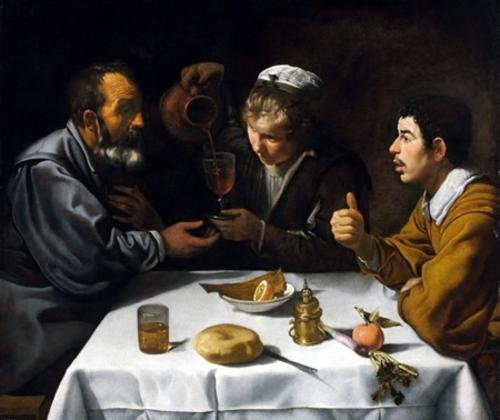
As I said before, the short answers give a feeling that there is some secret, something hidden. Like the cat and the mouse, the characters are cornered until they get to the truth:
They kept quiet. He ate slowly, despite his hunger, and drank a sip of cider from time to time. His face was aged, wrinkled, with signs of deep suffering.
Levesque asked him abruptly:
-What's his name?
The poor man answered, without raising his head:
-My name is Martin.
That name warns those present, especially the woman who is surprised:
And when he said this, his eyes and the woman's found themselves staring at each other, confusing their gazes into one.
And she stammered, trembling, anxiously:
-Are you my husband?
The poor man said calmly:
-Yes, I am.
The man releases that explosive truth with "calm", as if he were dropping a feather, as if those words meant nothing. Before this answer, the woman cries and hides her face in the apron. Martin tells us that his ship capsized, that only he and two friends survived, that later he was prisoner of some savages for 12 years, and that he was rescued by a good man. Faced with these events, Levesque does not know what to say and Martín, knowing that his wife has remarried, says:
-I don't want to hurt you. Let's fix everything. There are two children, and yours are three. Will the woman be yours, will she be mine? Resolve to your liking. But the house is mine, because my father left it to me, because I was born in it, and the papers are in the notary's office.
In this moment of the conversation between the two men, we feel that we are facing a commercial transaction; we see what interests Martin the most, and what he is not willing to leave to Levesque: the house. The woman can be from one or the other, it doesn't matter; it's another property. Faced with the dilemma, it is Levesque who decides:
Levesque had an idea.
Let's go to the priest's house and let him decide.
Martin got up, and the woman threw herself on his chest sobbing:
-My poor Martin, you've come! My poor Martin, you're home!
And she oppressed him in her arms, possessed abruptly by the loving memories of many years ago, which reminded her of her youth and her first caresses.
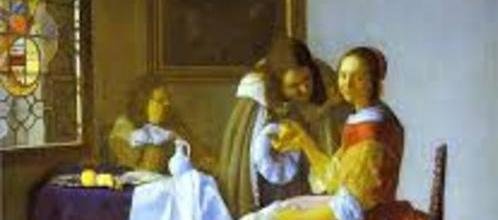
The effusive way in which the woman embraces Martin does not go unnoticed by those present, nor by the readers who can intuit in the woman a rebirth of passion. After this affectionate embrace, the two men go out to the street and when passing in front of a bar, Levesque asks Martin:
-Do you want us to have a drink?
-Well," answered the vagabond.
They went in, sat down, and Levesque called.
-Hey! Waiter! Two little glasses of brandy.
When the waiter came with the service they had asked for, Levesque said to him:
-Look, Martin is back, you know? Martin of my wife's, the one of the Two Sisters boat that was lost many years ago.
The waiter, approaching with two glasses and a bottle, simply asked:
-Hello! So Martin showed up?
And the repatriated man answered:
-Here I am.

This end leaves us with the impression that Martin is accepted among them, that he will be one more member of the family, of the town. That in the end the woman is still of the two men, for some reason they call her La Martín Levesque; that in the end they accept, in a silent agreement, to share the woman and the house.
I have always believed that many of the texts we read come from a reflection on reality. Reality vibrates, he says. I also believe that every text, whether poetic or narrative, has two faces: one hidden and the other visible. The idea is to try to know what says what is hidden and not visible to the naked eye. Some writers opt for irony, others for metaphor, to say more than what is in plain sight. Sometimes the simpler the endings, the more complex the reflections.
I hope you enjoyed reading this story. Remember to vote for @adsactly as a witness and visit our server in discord. Until the next smile. ;)

BIBLIOGRAPHICAL REFERENCE
http://www.histarmar.com.ar/AnecdotasNavales/Cechini/ElRegreso.htm
Written by: @nancybriti
Click on the coin to join our Discord Chat

Witness proposal is here:
Go To Steem Witness Page
In the bottom of the page type: adsactly-witness and press vote.

Use small letters and no "@" sign. Or, click here to vote directly!
Thank you!
As a storyteller who produced great works, Maupassant became one of the writers whose works were influential. It becomes interesting when reading a storyline that can tie us up to follow it so we will get a visit when reading this story. Characterizations and complications that are taken make us always interested and this time you choose the work of Maupassant, and as usual you bring it with a very crisp and easy to follow understanding.
Thank you @nancybriti
Thank you @adsactly
Thank you Steemit
Warm regard from Indonesia
I like reading a lot , specially novels and tales weitten by greatest writers like oscar wilde . This french writer seems a success in literature i like it :) support
How nice and thank you for your comment.
Thank you for bringing us Maupassant, @nancybriti; undoubtedly one of the relevant French 19th century storytellers and the best universal storytellers. Heir to that psychological realism that had been introduced into the French narrative of the time, particularly by Flaubert (the author of Madame Bovary), he was able to treat with a fine irony the relations between the typical protagonists of the social sectors of his time (especially the so-called "petty bourgeoisie"), a vision that, as with the great writers, even serves us to interpret our current realities. The tale shows a certain detachment of the author from marriage as an institution.
Good post, as are usually the ones you give us through @adsaclty's blog.
Maupassant is one of those writers who must be read and then read again for pleasure. With your comment you reminded me of the way in which Maupassant referred to marriage and especially to women. Hence maybe some stories from some of her stories. Grateful for your comment, @jsemalavem.
This story was recommended by Steeve to its users and upvoted by one or more of them.
Check @steeveapp to learn more about Steeve, an AI-powered Steem interface.
Birlikte kazanalım
I like reading literature, after I read literature like this, a sense of enthusiasm arose in me
That's a good thing. Thank you for your comment.
Hi, @adsactly!
You just got a 0.46% upvote from SteemPlus!
To get higher upvotes, earn more SteemPlus Points (SPP). On your Steemit wallet, check your SPP balance and click on "How to earn SPP?" to find out all the ways to earn.
If you're not using SteemPlus yet, please check our last posts in here to see the many ways in which SteemPlus can improve your Steem experience on Steemit and Busy.